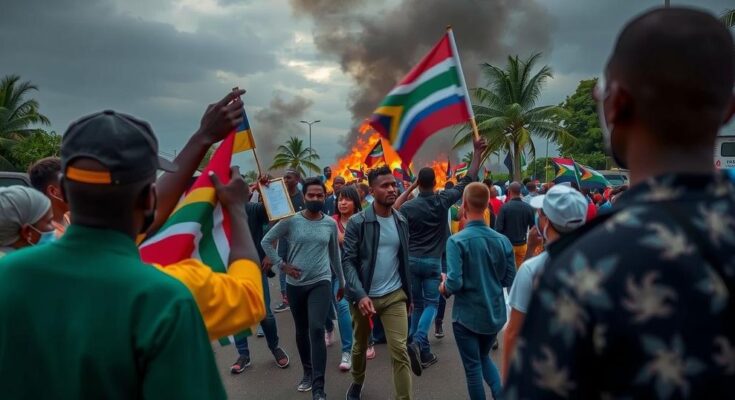Eruptions of violence in Mozambique, prompted by disputed election results, have resulted in the deaths of at least two protesters and severe police confrontations, leading to the closure of the border with South Africa. Opposition leader Venancio Mondlane has called for further demonstrations against what he alleges to be a rigged election, heightening tensions in the region.
Protests erupted in Mozambique on Wednesday in response to disputed election outcomes, leading to violent clashes with police and resulting in the closure of the primary border crossing with South Africa. Local reports indicate two fatalities, amidst claims by opposition leader Venancio Mondlane that the elections, which resulted in a victory for the ruling Frelimo party, were fraudulent. This unrest is part of a broader wave of dissent following the elections held on October 9. Human Rights Watch has reported that previous demonstrations have led to over 30 deaths due to police force. Demonstrations escalated in the northern city of Nampula, where law enforcement reportedly fired on crowds, resulting in casualties. Eyewitness accounts detail how residents attempted to march toward the city center but were met by heavily armed police who forcibly suppressed the gathering. Furthermore, in southern Mozambique, supporters of Mondlane obstructed the Ressano Garcia border crossing, causing significant traffic delays for trucks heading to South Africa. Protesters articulated their demands clearly; they seek transparency in the electoral process and express widespread frustration with the current political situation. The closure of the Lebombo post by South Africa’s Border Management Authority was confirmed due to the ongoing protests. Mozambique is in a politically precarious position as the southern African regional bloc, SADC, convenes an extraordinary summit to address the escalating tensions following the elections. Observers have noted significant irregularities in the voting process, leading the Constitutional Council to urge clarification regarding voter numbers before officially confirming election results. The evolving situation has raised concerns about the peaceful transition of power as President Filipe Nyusi approaches the end of his term in January.
The recent unrest in Mozambique stems from the contentious elections held on October 9, where the Frelimo party claimed victory amidst accusations of electoral fraud from opposition figures. Led by Venancio Mondlane, the opposition has rallied citizens to protest these results, citing a lack of transparency and integrity in the electoral process. Past protests have already been met with violent retribution from authorities, further inflaming public outrage and leading to calls for international attention to the escalating violence and instability in the region. The closure of the border with South Africa, a crucial trade link, reflects the serious implications of the political unrest on regional economic interactions and stability.
In summary, the protests in Mozambique highlight significant societal unrest regarding the legitimacy of the recent elections won by the ruling Frelimo party. With clashes resulting in fatalities and the closure of the border with South Africa, the situation necessitates urgent international observation and intervention. As the Constitutional Council prepares to review the electoral results, the populace continues to demand accountability and transparency from their leaders, signaling a critical juncture for Mozambique’s democratic integrity and regional stability.
Original Source: www.barrons.com




